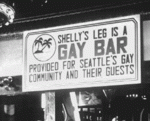Professor Michael Brown and UW Tacoma colleague Larry Knopp have been getting a lot of media attention for their ongoing study, “Biopolitical Geographies”. They are investigating the relations in the Pre-AIDS era between Seattle’s Gay & Lesbian community and health-promotion agencies. The project engages with urban, political, and health geographies, as well as urban gay history They are specifically exploring gays and lesbians’ relations and interactions with two parts of state/local governments: The Seattle-King County Public Health department and the Washington State Liquor Control Board, as well as the community’s efforts in health promotion and self-regulation. Issues such as “VD” control, contact tracing, (spatial) regulation of gay bars and taverns, and behavior all are of interest. As Brown puts it,
We are especially interested in these two state agencies because while we know a lot about other arms of the state (for example, the City Council, Human Rights Commission, the Police, and the courts), less is known about these more everyday, behind-the-scenes agencies. Research on other cities, however, have suggested that these agencies had quite powerful effects on gays’ lives and community formation. Yet Seattle has a distinct political and cultural geography, so we’re interested in finding out specifics of this city. Indeed, preliminary findings are suggesting a more complicated set of relations than the academic literature would suggest! They resonate with recent theoretical work on the geographies of governmentality and biopower.
Brown goes on to explain that "We are interested in the Pre-AIDS era (approximately before 1983) in Seattle, because this was a time of great social change in sexuality and local governance. We are doing both archival research and interviews with people who remember “VD” control back then, were treated or contact-traced by SKCPH, dealt with the Seattle Gay Clinic; or folks who worked in, managed, owned, or just hung out in old Seattle gay bars, taverns, or lounges.
The 50 people interviewed so far have offered insights that include: - "Blue laws" that regulated liquor sales could have quite an effect on gay and lesbian spaces: they dictated the floor plans of taverns, their visibility to the street (important if people were "in the closet"), and even the conduct of patrons. - Lesbians were required to wear at least three articles of feminine clothing, or else they risked being kicked out of a bar for appearing too "butch." - Health department investigators could be discreet, but were sometimes known to call the homes of closeted gay men who sought treatment for STDs – perhaps leaving a phone message with unassuming wives – to inquire about other sex partners. "What's emerging from our research is an understanding by bar owners and patrons of standards of behavior that had to be adhered to," Knopp said. The liquor board had broad authority to control the conduct of patrons and even declare decorations in bars or restaurants to be too sexually suggestive, he added. The board was allowed to enforce "the spirit of the law as well as the letter of the law," Knopp said, giving plenty of wiggle room to reflect the pervasive homophobic attitudes at the time. Like the TV character Sal Romano in "Mad Men," many gay Seattleites in the pre-AIDS era were in the closet, married and outwardly living as straight people. They feared losing their jobs or housing, being physically assaulted, being subjected to derision from family and friends, and other consequences of living an openly gay life. Even in liberal Seattle, many people at the time considered homosexuality a moral failure or mental illness. "Just because it's a liberal city doesn't mean that there wasn't moral regulation," Brown said. "We want to know how gay men and lesbians interacted with local policies related to day-to-day life."
This research is funded by the National Science Foundation (#1059732), endorsed by the Northwest Lesbian & Gay History Project, and Approved by the UW Human Subjects Division. If you are interested in being interviewed, please contact michaelb@uw.edu . Interviews are anonymous and confidential, transcripts will be returned for your editing. They take less than an hour and can be done at a time and place of your convenience. Thanks! Link to UW News Story on this research project Link to Seattle Weekly article
